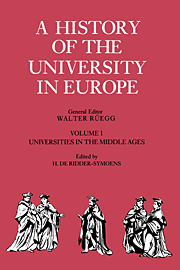Book contents
- Frontmatter
- Contents
- List of maps
- Contributors and editors
- Reader's guide
- Bibliographical abbreviations used in notes
- FOREWORD
- Acknowledgements
- PART I THEMES AND PATTERNS
- PART II STRUCTURES
- PART III STUDENTS
- CHAPTER 6 ADMISSION
- CHAPTER 7 STUDENT EDUCATION, STUDENT LIFE
- CHAPTER 8 CAREERS OF GRADUATES
- CHAPTER 9 MOBILITY
- PART IV LEARNING
- THE FACULTY OF ARTS
- EPILOGUE
- Editors' note on the indexes
- Name index
- Geographical and subject index
CHAPTER 8 - CAREERS OF GRADUATES
- Frontmatter
- Contents
- List of maps
- Contributors and editors
- Reader's guide
- Bibliographical abbreviations used in notes
- FOREWORD
- Acknowledgements
- PART I THEMES AND PATTERNS
- PART II STRUCTURES
- PART III STUDENTS
- CHAPTER 6 ADMISSION
- CHAPTER 7 STUDENT EDUCATION, STUDENT LIFE
- CHAPTER 8 CAREERS OF GRADUATES
- CHAPTER 9 MOBILITY
- PART IV LEARNING
- THE FACULTY OF ARTS
- EPILOGUE
- Editors' note on the indexes
- Name index
- Geographical and subject index
Summary
The interaction between university and society
The university is anchored in society by those who attend it and those who leave it. The word ‘university’ denotes a social body for its members. The nature of this anchorage in society is difficult enough to see in our own day, despite the fact that modern industrial societies, and, so it often seems, modern universities, have become very much alike. The question is more difficult for the very diverse societies and universities in the long stretch of time from the twelfth to the fifteenth centuries. Of no aspect of early university history is less known. The number of universities which came into existence in Europe in that period is known, but who knows how many different societies there were and how many local and regional élites within them?
This also explains the lack of a complete social history of medieval Europe and a comprehensive theory of its social history. To the question of the role of the university graduate in medieval society, only provisional and simplified answers are possible and even these apply only to limited areas. The present state of research permits us, however, to discern certain uniformities, particularly in those features which were important for the implantation of universities in society: a minimum of freedom and mobility for many and a minimum of legal stability for most social orders, which though hierarchical, were seldom static or impermeable; demographically, economically, and socially concentrated centres, i.e. cities; a gradual mutual differentiation between churches and states; respect for education and culture; special groups of agents servicing these and other demanding social functions.
- Type
- Chapter
- Information
- A History of the University in Europe , pp. 244 - 279Publisher: Cambridge University PressPrint publication year: 1991
- 4
- Cited by



